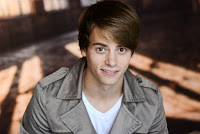I asked the participants about any A-ha! Moments they had in the first few days of the Program. The schedule is pretty relentless, but incredibly supportive, and there is a vast amount of material and tasks being asked of everyone, but there are also moments that click with you immediately.
"For me, my A-ha moment came in Voice/Text with Alison Matthews where she taught about the 3 Circles. You can find out about the 3 Circles,
here. I realized that social media, where I spend a great deal of my life, is mostly circle 3 and 1. As Circle 2 is true engagement, this explains why we can sometimes get exhausted and overwhelmed by social media. A small observation, but one that for me, resonates. The 3 Circles, and the desire to be in the Second Circle made me think about how we approach the work we do onstage. It's easy to fall back on the tricks of the 3rd Circle, with volume and gesture and a large presence, but we miss out on really engaging with those we are telling the story to." - Kristen Finlay
"So far my mind has
been blown at least twenty times. New images for breath that Ryan described,
the magic of honouring punctuation, and the empowerment that comes with useful
preparation are things I know will stay with me- just to name a few." - Julia Guy
 "Most of my "aha" moments have come from improv class, where
I've learned the value in "being average" and striving to play in the
moment, without judgement, and without the nagging impulse to put forth the
most clever, most unique, most self-affirming choices. Just being real and
honest and in the moment seems to yield the most interesting, most real
results." - Adam Sanders
"Most of my "aha" moments have come from improv class, where
I've learned the value in "being average" and striving to play in the
moment, without judgement, and without the nagging impulse to put forth the
most clever, most unique, most self-affirming choices. Just being real and
honest and in the moment seems to yield the most interesting, most real
results." - Adam Sanders
"Nearly my entire career has been focused on new work and creation based
performance and theatre. I'm lucky to have always had access to the
playwrights of any show I'm directing, so specific approaches to text analysis
have been eye opening and have allowed me to reflect, both positively and
constructively, on the dialogue I exchange with a playwright throughout a
process.
 Also...full disclosure: I'm
a professional theatre artist, and I've never been very excited about
Shakespeare. The past few days have made me realize I just never actually
learned how to read it." - Beth Dart, Intern Director
Also...full disclosure: I'm
a professional theatre artist, and I've never been very excited about
Shakespeare. The past few days have made me realize I just never actually
learned how to read it." - Beth Dart, Intern Director
"I've had a couple of big 'aha' moments already. One was having the
simple discovery that not every main character in a story is the hero.
As well, I was always terrified of improvising, and after doing a few of
Dennis Cahill's sessions I felt a "I can do this!" moment. It was so
great." - Emily McCourt
"What has been so
inspiring is the talent and openness of my fellow participants. There have been
times when I watched them with my mouth hanging open and thought, "How did they do that!?!"
I have also been so impressed with the
dedication, knowledge and respect shown us by our instructors. No gurus... No
one putting themselves above the work." - Stephen Gartner
"There have been many "aha" moments - being able to look at a
text with new eyes and being given some tools to use in analysis of the same,
and discovering "solfege" in music class! Our teacher, Ryan
Sigurdson is opening up a whole new area of understanding music - it's like
learning another language!" - Robin Craig
"I had an A-ha moment the other day in movement! I have always carried
tension in my shoulders and trying to release it is an ongoing challenge, but I
made a connection that it actually may have way more to do with tension in my
hips and the way I carry my ribcage. And we've been talking a lot about the
question why, and so then examining the potential reasoning behind that tension
placement was fascinating!" - Katie Ryerson
 "I am (re)learning that you can't grow authentically without failing and
that change is good. I've learned that punctuation is everything!" - Madison Walsh
"I am (re)learning that you can't grow authentically without failing and
that change is good. I've learned that punctuation is everything!" - Madison Walsh
 Defense Mechanisms - what happens to you when you fear something? Why is that thing in your head making you afraid?
Defense Mechanisms - what happens to you when you fear something? Why is that thing in your head making you afraid? 
























